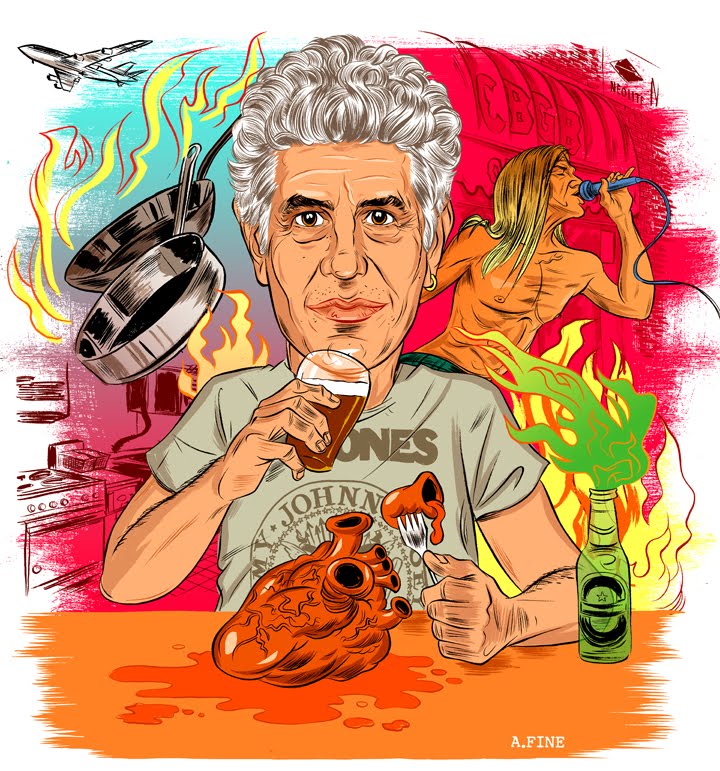
[Illustrations by ALEX FINE]
EDITOR’S NOTE: This interview originally ran back in November of 2011. We are re-posting it today on the second anniversary of his untimely death. Good night Mr. Bourdain, wherever you are.
![]() BY JONATHAN VALANIA Anthony Bourdain is a man who needs no introduction, but for those not in the know or without a consumptive cable habit, understand that he is the enfant terrible of the foodie world who came of age on the Punk Rock Planet of New York ‘77 simultaneously pogoing to the likes of the Ramones, Talking Heads, Television, and Patti Smith and shooting smack in the shithole bathrooms of CBGBs. Upon graduating from the Culinary Institute of America in 1978, he ran the kitchens of various fancy Big Apple eateries — including the Supper Club, One Fifth Avenue, and Sullivan’s — before winding up the executive chef at Brasserie Les Halles in 1998. In 2000, he penned the gonzo fin de siecle memoir Kitchen Confidential: Adventures in the Culinary Underbelly, which expanded on his infamous New Yorker piece, Don’t Eat Before Reading This, that begins thusly:
BY JONATHAN VALANIA Anthony Bourdain is a man who needs no introduction, but for those not in the know or without a consumptive cable habit, understand that he is the enfant terrible of the foodie world who came of age on the Punk Rock Planet of New York ‘77 simultaneously pogoing to the likes of the Ramones, Talking Heads, Television, and Patti Smith and shooting smack in the shithole bathrooms of CBGBs. Upon graduating from the Culinary Institute of America in 1978, he ran the kitchens of various fancy Big Apple eateries — including the Supper Club, One Fifth Avenue, and Sullivan’s — before winding up the executive chef at Brasserie Les Halles in 1998. In 2000, he penned the gonzo fin de siecle memoir Kitchen Confidential: Adventures in the Culinary Underbelly, which expanded on his infamous New Yorker piece, Don’t Eat Before Reading This, that begins thusly:
Good food, good eating, is all about blood and organs, cruelty and decay. It’s about sodium-loaded pork fat, stinky triple-cream cheeses, the tender thymus glands and distended livers of young animals. It’s about danger–risking the dark, bacterial forces of beef, chicken, cheese and shellfish. Your first 207 Wellfleet oysters may transport you to a state of rapture, but your 208th may send you to bed with the sweats, chills and vomits. Gastronomy is the science of pain.
Kitchen Confidential soon occupied the New York Times best seller list and led to Bourdain hosting his own show on the Travel Channel, No Reservations, wherein he trots the globe sampling the outre customs and exotic cuisines of various indigenous peoples and, for fear of offending his hosts, and in the pursuit of damn good television, bravely chomps down just about everything put in front of him, including: sheep testicles, ant eggs, seal eyeballs, a whole cobra with its heart still beating, and, most disgustingly, a warthog’s anus, which required him to take Cipro for two weeks. In my book, he is pretty much The Coolest Man On Earth. Given that chefs are the new rock stars, I hereby dub him ‘The Lou Reed of Food’ — just remember you heard it here first, folks. Recently, Phawker got Bourdain on the horn to talk about eating dog, shooting smack, dissing Philly and, of course, hating on Billy Joel.
PHAWKER: You caused a bit of a ruckus a few years back when you sort of dismissed Philly as a “two-horse town,” Stephen Starr and George Perrier. Would you take that back if you could? Do you still feel that way?
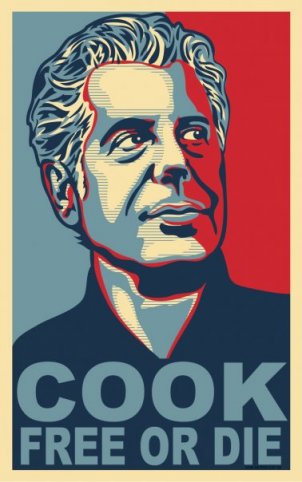 ANTHONY BOURDAIN: I certainly would take it back in a hot second. The only thing that’s in my way is there are increasingly large numbers of really good restaurants there or interest places for sure, a large number have come to Philadelphia since I made that comment. But having great restaurants only is not generally what I do. I’m looking for something different. If you had a huge Cambodian community, that would be interesting. Good fine dining which Philadelphia has, good Italian food which Philadelphia has, that’s not making a show for me yet.
ANTHONY BOURDAIN: I certainly would take it back in a hot second. The only thing that’s in my way is there are increasingly large numbers of really good restaurants there or interest places for sure, a large number have come to Philadelphia since I made that comment. But having great restaurants only is not generally what I do. I’m looking for something different. If you had a huge Cambodian community, that would be interesting. Good fine dining which Philadelphia has, good Italian food which Philadelphia has, that’s not making a show for me yet.
PHAWKER: Aside from the fancy-pants restaurants in town, which there are more and more of these days, there is interesting stuff out in the neighborhoods.
ANTHONY BOURDAIN: I don’t know anything about it. It’s a personal failing that we haven’t found a way into yet. We will, there’s no doubt about it.
PHAWKER: Where are you planning to eat when you get to Philly?
ANTHONY BOURDAIN: I’m in the middle of a tour so generally I pull in late in the afternoon, all I have time for is to check into the hotel, throw some water on my face, take a bite of cheese from the complementary cheese tray, do my gig, by the time I’m doing the signing and the picture taking afterwards I collapse into my bed at 1 AM, wake up at 4:30 or 5 and I’m off to the next city. So unfortunately this time around I will shamefully not be getting around.
PHAWKER: Let’s talk about some of the stranger things you’ve eaten – sheep testicles, ant eggs, seal eyeball, whole cobra with it’s heart still beating, warthog’s anus, which required you to take Cipro for two weeks – where do you draw the line? Is there anything you wouldn’t put in your mouth?
ANTHONY BOURDAIN: I try to avoid dog, that’s for sure. I’ve managed to gracefully avoid having that presented to me. I try to be a good guest. I try to eat whatever’s put in front of me. But at the same time, I’ve made efforts to not find myself in a position where my host is surprising me with dog.
PHAWKER: There is a Mexican place here in Philly called Los Taquitos De Puebla that sells eyeball tacos.
ANTHONY BOURDAIN: Oh yeah, that’s very classic, I’ve had a lot of that in Mexico. That’s very ordinary food. I’ve had a lot of it. It’s good.
PHAWKER: Touché. Is it cow eyeball?
ANTHONY BOURDAIN: Yes.
PHAWKER: A couple things here I wanted to check off in the true/false column. Did you really tell your kids that eating at McDonald’s causes retardation?
ANTHONY BOURDAIN: I wanna be careful for libel purposes here, but I may or may not have suggested that there might be some linkage.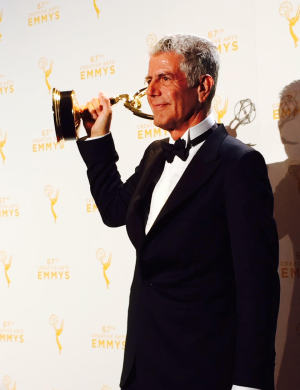
PHAWKER: Fair enough.
ANTHONY BOURDAIN: That was hyperbole I think. I have definitely said that it’s icky and might have suggested a link with cooties.
PHAWKER: How do you stay so trim while cooking and eating for a living?
ANTHONY BOURDAIN: It’s really something to think about. If I’m shooting in Italy for ten days, the crew and me we’ll all gain ten pounds. If I’m shooting in Italy or south of France I try to schedule a shoot some place where the food’s not very good or we don’t have much expectation of eating heavily, maybe a noodle and broth culture or someplace like a very poor country. We try to mix it up, cause you know, if I’m shooting in Italy, France, and Spain all in a row, I will come home and find myself 15 pounds heavier. With me, if I put on six pounds it feels like a ton.
PHAWKER: Let’s talk a little about your take on vegetarianism, which you have labeled a “first world luxury.”
ANTHONY BOURDAIN: What I mean by that is, personal choices people make in their own homes and their own communities, I have absolutely no argument with. If you choose for whatever reason, reasons of conscience or personal preference or for whatever reason, if you live in Philadelphia and choose to live a vegetarian or vegan lifestyle, I hardly argue about it. It’s your choice. In fact, if you’re traveling to Rome or Paris or the industrialized world, again, these are restaurants you can generally call ahead and inquire if they have vegetarian options and you can eat reasonably well. But I have found from my personal experience that many of the most of the most interesting and amazing places in the developing world, it’s very awkward and will not be understood when you say, “I cannot eat what you’re offering me. I will not eat what you’re offering me.” First of all, it strikes me as being curious when one would go to Thailand or China, these amazing countries with these amazing cuisines and not wanna find out as much as you can about their culture, especially their cooking culture which is so extraordinary, but you would again and again find yourself having to offend often very poor hosts who are very proudly offering you their best. Like it or not, they will just not understand and not accept it, they will be offended and in some cases disgraced in front of their neighbors. I just see it as rude, with traveling, to be many of the places I’ve been, to insist on eating in your preferred style would force you to be rude.
PHAWKER: When in Rome, right?
ANTHONY BOURDAIN: I believe when in Rome, eat as the Romans. Otherwise, why bother to go? Most of the relationships I’ve made around the world are to my willingness to accept with good grace and good humor and with gratitude what’s offered.
PHAWKER: What is your take on the whole ‘buy local’ or the slow food movement?
ANTHONY BOURDAIN: I’m all for it. Who could possibly be against it? It’s wonderful that we increasingly have these options. Even at its silliest and most ideological it’s certainly a good thing.
PHAWKER: Not that you’re an expert on these matters, but what do you make of this notion that the only way to feed the world is through factory farming?
ANTHONY BOURDAIN: That is an inescapable fact, an unavoidable fact. We’re not going to revert to an agrarian society where every foot of real estate in the entire world is arable land. There are millions of Indians toiling on farms now working their fingers to the bones so their kids can be engineers. Who will work these farms of the future that we’re talking about? It’s the sort of thing that people who already envision this, like Berkeley, where they’re getting plenty of good delicious local vegetables and live in a fertile area, feel free to say. Many of the people in the world who work on farms are working hard so the next generation doesn’t have to. It’s hard to be a farmer. Also, a rice farm struggling to make a living for his family in Vietnam is probably pretty damn happy with pesticide. It’s inconceivable. There aren’t enough fish in the world to feed the whole world. Unfortunately, fish farming is a way that a lot of the world can eat. Hopefully we can do it in a sustainable and non-toxic way, there aren’t environments contaminating some of the few remaining wild fish. I don’t like Big Corn, I don’t like the system as it is, but there are a lot of hungry people out there. That’s what has to balance these things. I’m very happy any time I hear of a small farmer doing organic local seasonal food and forming relationships with chefs and restaurants, a real community of growers and some providers, people cooking and selling food – that’s great. But we have to be realistic about what our planet is. All these things 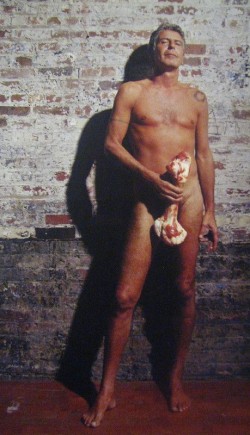 are interlocked. In order to change the world, it’s not just our food supply we’d have to change, we’d have to change our entire socio-economic structure worldwide. Unless the Khmer Rouge get back to power as an international force I don’t see that happening.
are interlocked. In order to change the world, it’s not just our food supply we’d have to change, we’d have to change our entire socio-economic structure worldwide. Unless the Khmer Rouge get back to power as an international force I don’t see that happening.
PHAWKER: What do you make of the whole Occupy Wall Street movement?
ANTHONY BOURDAIN: I understand the anger. My understanding of what their message is, I don’t know what it is, it’s not so well defined in my head but I certainly understand the anger and frustration. I’m generally supportive of that anger, a banking system that’s privatizing profits and socializing losses. I’m against that. Who wouldn’t be? Except the bankers.
PHAWKER: You’ve been very frank about your appreciation for recreational drug use over the years. If there was one drug you could take now consequence-free out of all the drugs you’ve tried, what would it be?
ANTHONY BOURDAIN: Oh, heroin. Consequence free? No health effects?
PHAWKER: No health effects, you can’t get arrested.
ANTHONY BOURDAIN: When I had the time, and I didn’t have any personal responsibilities, or the responsibilities of being a father – I certainly enjoyed that part for a while until it ruined my life, as it always does.
PHAWKER: No one ever seems to beat heroin. Heroin always wins.
ANTHONY BOURDAIN: Yeah, that’s kind of the point. It’s a death-trap of sorts.
PHAWKER: I know you dig music, what you’re listening to these days?
ANTHONY BOURDAIN: I’m obsessed with the Rome album, the Danger Mouse and Daniele Luppi album. I think it’s awesome.
PHAWKER: I wanted to confirm this very hilarious Billy Joel story, that you banned the playing of his music in your kitchen, that he heard about this, came to your restaurant, snuck into the kitchen and posed for pictures with your cooking staff, then emailed the photos to you and said “See, I’m in your kitchen” — that is all true?
ANTHONY BOURDAIN: We had had dinner previously, he called, made a reservation and he came in and we had dinner together, and we got along very very well. He was well aware of my position on his music before he came to dinner. We’ve had dinner a number of times. But yes, he did sneak into my kitchen once and sent me a photograph saying, “I guess you do let Billy Joel in your kitchen.” It also said, “PS, I also hate the Grateful Dead.” I like him very much by the way, I’m just not a fan of his records.
RELATED: In 1965, Tacoma, Washington’s The Sonics released a debut album of raw-boned, hemorrhagic garage-punk and maximum R&B called, simply, Here Are The Sonics. Exponentially louder, wilder, and weirder than their woolly-bully frat-rock brethren on the SeaTac teen club/roller rink/armory circuit, The Sonics sang about witches, psychopaths, Satan, and strychnine as a social lubricant, along with the more standard themes of hot girls and fast cars, or, even better, fast girls in hot cars. The 12 tracks on Here Are The Sonics capture the needle-pinning, speaker-blowing, tonsil-shredding, balls-to-the-wall mating call of five hormonal mid-’60s teenage savages forever in hot pursuit of Mad Men-era booze-cigarettes-sex-magic and the glorious din that made it all possible.
Fifty years after its release, Here Are The Sonics still sounds, as one wag aptly put it, “as raw as a freshly scraped kneecap.” On the continuum of rock ’n’ 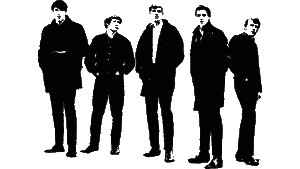 roll as a 20th-century art form, Here Are The Sonics remains a vital and important relic, the aural equivalent of a prehistoric cave painting, as primitive as it is seminal. It changed music. More accurately, it changed the people who would change music. Jack White called it “the epitome of ’60s punk.” Kurt Cobain said it had “the most amazing drum sound I’ve ever heard…it sounds like he’s hitting harder than anyone I’ve ever heard.” On “Losing My Edge,” LCD Soundsystem’s James Murphy concludes his itemized list of the essential artists in the definitive hipster record collection by invoking The Sonics four times in a row, as if casting a spell.
roll as a 20th-century art form, Here Are The Sonics remains a vital and important relic, the aural equivalent of a prehistoric cave painting, as primitive as it is seminal. It changed music. More accurately, it changed the people who would change music. Jack White called it “the epitome of ’60s punk.” Kurt Cobain said it had “the most amazing drum sound I’ve ever heard…it sounds like he’s hitting harder than anyone I’ve ever heard.” On “Losing My Edge,” LCD Soundsystem’s James Murphy concludes his itemized list of the essential artists in the definitive hipster record collection by invoking The Sonics four times in a row, as if casting a spell.
Feeble national promotion and ham-fisted distribution may have ensured that few outside of The Sonics’ Pacific Northwest stomping ground heard Here Are The Sonics when it was first released, but in the fullness of time its sphere of influence now transcends generations and spans continents thanks to the Esperanto of electrifying noise. Anthony Bourdain, host of CNN’s Parts Unknown, used “Have Love, Will Travel” in promos for the current season. He emailed the following when I asked him why: “The Sonics were true originals, garage before garage, the way rock and roll should be: loud, dirty and dangerous.” MORE
